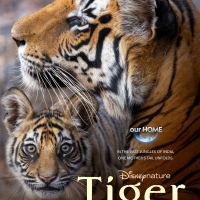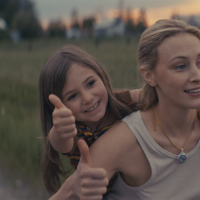VOD Review: Gunda
By John Corrado
★★★½ (out of 4)
 Shot in black-and-white and entirely free of dialogue, Russian filmmaker Viktor Kosakovskiy’s documentary Gunda is an often hypnotic piece of experiential cinema that captures the day to day lives of a group of farm animals.
Shot in black-and-white and entirely free of dialogue, Russian filmmaker Viktor Kosakovskiy’s documentary Gunda is an often hypnotic piece of experiential cinema that captures the day to day lives of a group of farm animals.
The film, which boasts actor and noted animal rights activist Joaquin Phoenix as an executive producer, is named for a mama pig, Gunda, who lives on a farm with her piglets. We meet her in the opening sequence poking her head out of the barn door, as playful, curious piglets emerge around her.
The film unfolds entirely through long takes such as this one, the camera sometimes staying still and other times gently moving to follow the animals. We watch the pigs for a while, then shift to following some chickens, including a bird who struts about with only one leg. We go back to the pigs, and then some cows enter the picture. And this is the extent of the story.
There is no voiceover narration giving anthropomorphic personalities to these creatures, and no musical score, just the sounds of pigs grunting, grass rustling, flies buzzing and cows mooing. While Kosakovskiy doesn’t use the film to make an explicit statement about vegetarianism or veganism, he doesn’t need to, either. The gorgeously shot monochromatic images, which the credits reveal were shot in Norway, Spain and the UK, fully speak for themselves.
The point of this film is for us to simply observe these animals, and come to our own conclusions about their sentience and autonomy, and the nature of their lives on a farm. What I saw was piglets playing in a way that is indiscernible from happy puppies, and cows that are close enough to the camera to notice the oddly human mops of hair on their heads and the expressions in their eyes. I saw piglets peaking their snouts out of the barn during a rain shower to catch water droplets in their mouths, followed by the pigs luxuriously lounging in the mud puddles that follow this rainstorm.
There is a hypnotizing, almost relaxing nature to these images, with the camera mostly staying at eye level with the animals, allowing us to reflect on the nature of their existence. You could start the film at any point and still get something out of it. It almost exists as a loop that could be started over again as soon as it finishes. What Kosakovskiy has done is to capture the daily lives of farm animals in a way that is both engaging and surprisingly poignant, offering an entirely unique cinematic experience in the process.
Gunda is now available on a variety of Digital and VOD platforms. It’s being distributed in Canada by Elevation Pictures.










